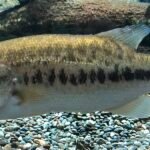The aquaculture industry relies on the development of new ingredients from sustainable sources for feed production. One of the trends in identifying new ingredients is the use of low trophic level resources such as zooplankton.
Zooplankton like Calanus finmarchicus, distributed throughout the northern hemisphere, is a promising candidate as feed ingredients due to its optimal nutrient profile and sustainable harvest potential in large volumes.
Enzymatic protein hydrolysis (EPH) is a commonly used method to process raw materials into industrial-scale feed ingredients. EPH employs food-grade proteases to digest protein-rich biomass, resulting in products that consist of a water-soluble peptide fraction, lipids, and a solid fraction of insoluble residues.
Scientists from The Norwegian College of Fishery Science, Nofima, Calanus AS, and SPAROS Lda investigated whether a C. finmarchicus protein hydrolysate could influence the growth performance of European sea bass (Dicentrarchus labrax) juveniles.
Formulation of Experimental Diets
The scientists formulated four experimental diets with low levels of fishmeal and wheat gluten, compensated with marine hydrolysate products (calanus, salmon, sardine, and tuna) and additional vegetable proteins.
“To ensure that all diets provided equivalent protein content, the inclusion level of hydrolysates ranged between 2.95% and 4.20% (dry basis) based on their different crude protein contents,” they described.
Improved Sea Bass Growth
The study involved feeding trials to compare the growth-promoting effects of calanus hydrolysate with those of sardine, tuna, and salmon protein hydrolysates.
“The inclusion of a new marine zooplankton protein hydrolysate, C. finmarchicus, in the diet led to improved growth performance of European sea bass in a feeding trial comparing marine protein hydrolysates as functional food ingredients,” the scientists reported.
According to the study’s authors, the European sea bass juveniles accepted all diets.
Stay Always Informed
Join our communities to instantly receive the most important news, reports, and analysis from the aquaculture industry.
“Fish receiving the calanus hydrolysate showed a higher protein efficiency ratio, significantly higher than those fed with other hydrolysates,” the study described.
Effect of Hydrolysate on Skeletal Muscle Cells
The scientists conducted an in vitro bioactivity experiment to determine whether the mineral contents of calanus hydrolysate affected the growth of skeletal muscle cells, using an Atlantic salmon muscle cell model.
“The initial bioactivity experiment showed that desalinized hydrolysates performed better in cellular studies. A possible explanation is that the cultured cells are more susceptible to higher mineral contents than their innate concentrations,” they noted.
The researchers highlighted that the results suggest the positive effects of calanus hydrolysate on muscle growth originate from its inherent peptides rather than its mineral content. Therefore, they chose calanus hydrolysate for the subsequent in vitro experiments.
Conclusions
“The inclusion of calanus hydrolysate in the diet of European sea bass juveniles resulted in increased growth performance and feeding efficiency compared to other commercial marine hydrolysates, highlighting the potential of calanus hydrolysate as a functional ingredient in fish feed,” the scientists concluded.
In the in vitro study, the researchers reported that low molecular weight fractions of calanus hydrolysate were associated with increased viability and proliferative activity in the salmon skeletal cell model.
Contact
Isak Bøgwald
The Norwegian College of Fishery Science, UIT—The Arctic University of Norway, P.O. box 6050, 9037, Tromsø, Norway
Calanus AS, P.O. box 808, 9258, Tromsø, Norway
Email: isak.a.bogwald@uit.no
Reference (open access)
Bøgwald, I., Østbye, TK.K., Pedersen, A.M. et al. Calanus finmarchicus hydrolysate improves growth performance in feeding trial with European sea bass juveniles and increases skeletal muscle growth in cell studies. Sci Rep 13, 12295 (2023). https://doi.org/10.1038/s41598-023-38970-5
Editor at the digital magazine AquaHoy. He holds a degree in Aquaculture Biology from the National University of Santa (UNS) and a Master’s degree in Science and Innovation Management from the Polytechnic University of Valencia, with postgraduate diplomas in Business Innovation and Innovation Management. He possesses extensive experience in the aquaculture and fisheries sector, having led the Fisheries Innovation Unit of the National Program for Innovation in Fisheries and Aquaculture (PNIPA). He has served as a senior consultant in technology watch, an innovation project formulator and advisor, and a lecturer at UNS. He is a member of the Peruvian College of Biologists and was recognized by the World Aquaculture Society (WAS) in 2016 for his contribution to aquaculture.







